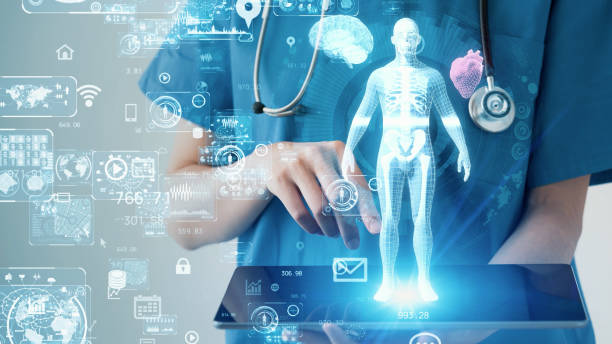Introduction to AI in Medicine
Imagine having a doctor who never sleeps, never misses a symptom, and constantly learns with every case. That’s the promise of artificial intelligence (AI) in medical diagnostics. In a world where early detection can save lives, AI is emerging as a game-changer.
The Growing Need for Innovation in Diagnostics
With a global shortage of medical professionals and increasing patient loads, traditional diagnostic methods are being stretched thin. Delayed diagnoses, misinterpretations, and inaccessible care in rural areas demand innovative solutions. AI steps in to bridge the gap—fast, accurate, and scalable.
What is Artificial Intelligence in Healthcare?
AI in healthcare refers to the use of algorithms and software to analyze complex medical data. It mimics human intelligence to recognize patterns, draw conclusions, and support decision-making. In diagnostics, it’s like giving doctors a supercharged second opinion.
Core Technologies Behind AI Diagnostics
Machine Learning and Deep Learning
At the heart of AI diagnostics lies machine learning (ML). Think of it like teaching a child to recognize a dog by showing thousands of pictures—AI learns the same way, only with medical images, lab results, or clinical notes.
Deep learning, a subset of ML, uses neural networks to dig even deeper. It powers facial recognition tech—and now, it’s doing the same for tumors and anomalies.
Natural Language Processing (NLP)
NLP helps AI read and understand unstructured data like doctors’ notes, lab reports, and patient histories. Instead of being buried in files, this information becomes part of the diagnostic process.
Computer Vision in Radiology
AI’s computer vision can scan through hundreds of images in seconds, highlighting abnormalities a human might miss. It’s like having a digital microscope on steroids.
Key Areas Where AI is Transforming Diagnostics
Radiology and Imaging
AI in X-rays, MRIs, and CT Scans
AI algorithms can detect pneumonia from chest X-rays, brain bleeds from CT scans, and even identify cancers in MRIs—all in minutes. Companies like Aidoc and Zebra Medical Vision are already implementing this in hospitals.
Pathology and Histology
Gone are the days of manually examining thousands of slides. AI tools can now scan digital pathology slides and identify cancerous cells with high accuracy. This means faster diagnosis and treatment planning.
Dermatology and Skin Cancer Detection
Snap a photo of a mole, and an AI-powered app can tell you if it’s benign or suspicious. With smartphone cameras and AI, skin cancer checks are literally in your pocket.
Cardiology and ECG Analysis
AI can analyze ECGs to detect irregular heart rhythms like atrial fibrillation. In some studies, it’s even outperformed seasoned cardiologists.
Ophthalmology and Retinal Disease Detection
AI systems, like those developed by Google’s DeepMind, can detect diabetic retinopathy and macular degeneration with impressive accuracy. These tools are vital in areas lacking eye specialists.
Predictive Analytics for Early Disease Detection
AI doesn’t just diagnose—it predicts. By analyzing health records and patterns, AI can flag individuals at high risk for conditions like diabetes, stroke, or heart disease before symptoms show.
Real-World Applications and Success Stories
Google’s DeepMind in Eye Disease
DeepMind partnered with Moorfields Eye Hospital and created an AI that diagnoses over 50 eye diseases with 94% accuracy. It’s a peek into the future where machines and medicine work in tandem.
IBM Watson and Cancer Diagnosis
IBM’s Watson for Oncology analyzes patient data and research to recommend cancer treatments. In some cases, it found viable options that human doctors hadn’t considered.
Aidoc and Emergency Radiology
Aidoc helps ER doctors prioritize life-threatening cases by quickly flagging critical abnormalities in imaging—saving valuable time in emergencies.
Benefits of AI in Medical Diagnostics
Speed and Accuracy
AI can process vast amounts of data in seconds, leading to quicker and often more accurate diagnoses than traditional methods.
Reducing Human Error
Fatigue, distractions, and workload can lead to mistakes. AI doesn’t get tired or distracted, offering a fresh set of eyes every time.
Scalability for Global Health
AI can bring quality diagnostics to remote areas where specialists are scarce, leveling the playing field for global health access.
Challenges and Ethical Concerns
Data Privacy and Security
Patient data is sensitive. AI systems must be designed with iron-clad security to protect it from breaches or misuse.
Bias in AI Algorithms
If an AI system is trained on biased or incomplete data, it can produce skewed results. Ensuring diversity in training datasets is crucial.
Regulation and Approval Hurdles
AI tools need to be tested, validated, and approved before widespread use. Regulatory frameworks are still catching up with rapid innovation.
The Role of Clinicians in the AI Era
AI as an Assistant, Not a Replacement
Let’s be clear: AI won’t replace doctors—it will empower them. Think of AI as the Iron Man suit and the doctor as Tony Stark.
The Importance of Human Oversight
Doctors bring empathy, intuition, and ethical judgment—qualities AI can’t replicate. Human oversight ensures AI decisions are interpreted and applied appropriately.
The Future of AI in Diagnostics
Personalized Medicine and AI
AI can analyze your genetic makeup, lifestyle, and history to tailor treatments specifically for you. Welcome to the era of precision medicine.
Integration with Wearables and IoT
Wearables like smartwatches are becoming mini health labs. AI interprets their data to provide real-time diagnostics and alerts.
Global Accessibility and Remote Diagnostics
In the future, AI-powered diagnostic kits could reach underserved regions, bringing healthcare access to the world’s most remote corners.
Conclusion
AI is not just improving diagnostics—it’s transforming it. From speeding up analysis to detecting diseases early and accurately, AI is becoming an indispensable partner in modern medicine. But while the tech is exciting, it’s the blend of AI’s power and human compassion that truly promises a healthier future for us all.
FAQs
1. What diseases can AI diagnose?
AI can assist in diagnosing cancer, heart disease, diabetic retinopathy, neurological disorders, and skin conditions, among others.
2. Is AI more accurate than human doctors?
In some areas like imaging, AI can match or even exceed human accuracy. However, it works best as a supportive tool, not a replacement.
3. Will AI replace doctors in diagnostics?
No. AI will enhance doctors’ capabilities but not replace them. Human judgment and empathy are irreplaceable in healthcare.
4. How secure is patient data in AI systems?
With proper encryption and compliance measures, AI systems can be very secure. But it’s an ongoing challenge that needs constant vigilance.
5. What’s next for AI in medical diagnostics?
Expect deeper integration with wearable devices, more personalized diagnostics, and wider use in underserved regions.




Pingback: Streamline Business Operations with AI Workflow Automation